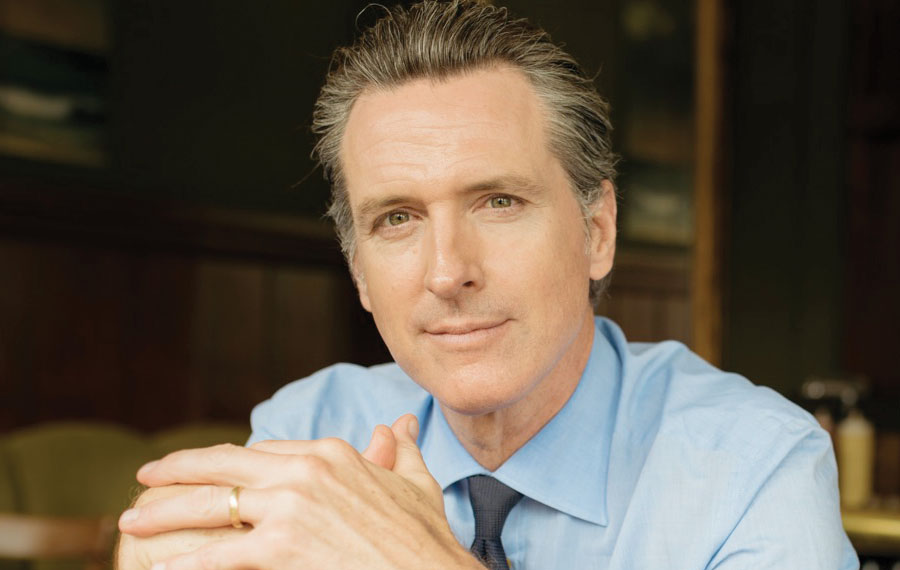 Gavin Newsom
Gavin Newsom California Gov. Gavin Newsom had a busy February. He sued the Trump administration over the president’s decision to declare a national emergency at the U.S.-Mexico border; he announced dramatic cutbacks to former Gov. Jerry Brown’s two biggest infrastructure projects — a high-speed rail line and proposed changes to the state’s water distribution system; and he promised broad overhauls of state housing, health care and immigration policies.
But Newsom has been much quieter about what could be his most significant upheaval — a fundamental shift in the state’s approach to public education. For more than a quarter century, California has been a national leader in the development and growth of charter schools — public schools that are given more autonomy and flexibility to attempt more innovative approaches to educating their students. That may be about to end.
The original 1992 legislation sponsored by Democratic state Sen. Gary Hart of Santa Barbara authorized the creation of 100 charter schools in the state. Today, more than 1,300 charters educate 630,000 students, roughly one-tenth of California’s total public school population.
Charter schools make up some of the state’s best and worst public schools. The original plan was for the most successful charters to be copied and for the worst to be closed. But over the years, two equally committed and equally well-financed groups of public school advocates — union-backed traditionalists on one side and a coalition of wealthy reformers and low-income minority communities on the other — have become embroiled in a scorched-earth battle.
The two sides have traded body blows, but nowhere more fiercely than in the Los Angeles Unified School District (LAUSD). Traditionalists and reformers have spent tens of millions of dollars on political campaigns to get their candidates elected to the LAUSD Board of Education, which controls the nation’s second-largest school district. Nearly 20 percent of LAUSD’s students, about 112,000, are enrolled in its 225 charters.
The competition for students is especially intense, mainly because each student represents a large amount of state funding. In an ultra-expensive housing market that makes housing increasingly unaffordable for families with children, the budgetary strain on LAUSD has become so intense that its teachers went on strike in January for the first time in decades. Some of their demands called for higher salaries and more support staff, but the most difficult part of the negotiations centered around charter schools.
When the strike was settled, the school board had agreed to a resolution asking Newsom to impose a moratorium on new charters in the district. A few days later, Newsom asked State Superintendent of Public Instruction Tony Thurmond to convene a panel that would examine the financial impact of charter schools. Thurmond already has called for a statewide moratorium on charter school expansion, so he likely will follow through on such a plan in the next few months.
In the past few weeks, Newsom began pushing for legislation that would increase transparency and oversight for charter schools. While such a law would create administrative headaches for smaller charters, it would provide an appropriate level of increased oversight to which all public schools should accede.
Holding charter schools accountable is one thing, but banning them is another. And that may be where California is headed.
Alex Caputo-Pearl, head of the teachers union, United Teachers Los Angeles, applauded Newsom’s action, arguing that “public school districts across the state, including Los Angeles Unified, are being financially strangled by the unmitigated growth of charter schools….”
Charter schools are not going to disappear tomorrow, but rhetoric like this from a strong Newsom ally suggests some very rough waters ahead for school-choice advocates.
Ironically, charter schools originally were intended as a compromise between public schools and private-school vouchers. Now, the options available to California parents within the public school system are likely to narrow considerably.
Dan Schnur is a professor at USC’s Annenberg School of Communication and Journalism, UC Berkeley’s Institute of Governmental Studies and Pepperdine University. He is the founder of the USC-L.A. Times statewide political survey and a board member of the Los Angeles Museum of the Holocaust.





















 More news and opinions than at a Shabbat dinner, right in your inbox.
More news and opinions than at a Shabbat dinner, right in your inbox.